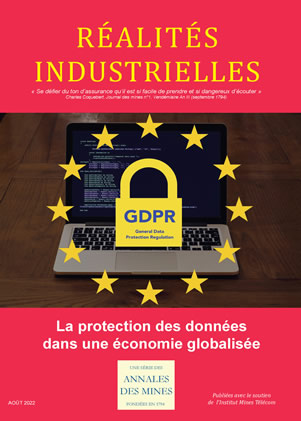| |

|
|
 Août 2022 - La protection des données dans une économie globalisée Août 2022 - La protection des données dans une économie globalisée
Aligning access to microbiome data and privacy considerations for better solutions for health and wellbeing of society and environments
By Frederik COPPENS
VIB-UGent, ELIXIR Belgium, Gent Belgium
Lene LANGE
BioEconomy Research & Advisory, Copenhagen, Denmark
And
Kathleen D’HONDT
Department Economy, Science and Innovation, Flemish Government, Brussels, Belgium
here is a growing body of evidence that underpins the importance of microbiomes in biology. Understanding the functioning of microbiomes and their interaction with the environments will allow to develop novel interventions to support human, animal, and plant health as well as the environment. The potential that microbiomes can have to prevent the onset of non-communicable diseases is huge. This can only be developed when studying the impact of lifestyle, nutrition and environment in the context of the genetic content. As human microbiomes have been shown to be stable over time and can allow to identify the ‟carrier” of the microbiome, access to microbiome data has been questioned in the light of privacy protection and the General Data Protection Regulation. In this paper we discuss the potential of microbiomes in different areas and how microbiome data may be shared to support the concept of doing good.
 Télécharger gratuitement l'article Télécharger gratuitement l'article
 Retour au sommaire Retour au sommaire
 August 2022 - Data protection in a global economy August 2022 - Data protection in a global economy
Aligning access to microbiome data and privacy considerations for better solutions for health and wellbeing of society and environments
Frederik Coppens,
VIB-UGent, ELIXIR Belgium, Gent,Belgium,
Lene Lange,
BioEconomy Research & Advisory, Copenhagen, Denmark,
and
Kathleen D’Hondt,
Department Economy, Science and Innovation, Flemish Government, Brussels, Belgium
There is a growing body of evidence that underpins the importance of microbiomes in biology. Understanding the functioning of microbiomes and their interaction with the environments will allow to develop novel interventions to support human, animal, and plant health as well as the environment. The potential that microbiomes can have to prevent the onset of non-communicable diseases is huge. This can only be developed when studying the impact of lifestyle, nutrition and environment in the context of the genetic content. As human microbiomes have been shown to be stable over time and can allow to identify the ‘carrier’ of the microbiome, access to microbiome data has been questioned in the light of privacy protection and the General Data Protection Regulation. In this paper we discuss the potential of microbiomes in different areas and how microbiome data may be shared to support the concept of doing good.
 Retour au sommaire Retour au sommaire
|
|




